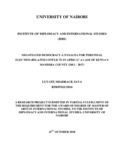| dc.description.abstract | Following the end of the Cold War, a third wave of multiparty democracy spread across Sub-Saharan Africa. The West in their quest to defeat the Soviet Union had embraced authoritarian regimes in Africa. But after the collapse of the USSR, the United States and other Western powers implored on their former allies in Africa to embrace multiparty democracy if they wanted to continue receiving aid from the Western controlled Bretton Woods Institutions. In opening up the democratic space, the hitherto Western allies in Africa were now required to abandon single party rule that had dominated the continent’s political scene while at the same time observing periodic free and fair multiparty elections. This new requirement was intended to improve governance and accountability while at the same time hastening the democratization process. Despite this noble intention of entrenching majoritarian democracy in Africa, multiparty elections and political competition in general has brought with it increased cases of election-related conflicts that have resulted in loss of life and dire economic consequences. In some cases like Angola and Mozambique, the outcome was a prolonged civil war that spanned over a decade. In retrospect, most African States are multi-ethnic in nature and it is only a shared antipathy for the colonial masters that pushed the diverse nations to work together. Nation-states like Somalia too have witnessed political competition being reduced to bloody clan rivalries impeding realization of peace and stability.
This study therefore examines the potential of negotiated democracy in resolving election-related conflicts in Africa by examining a case study of Kenya’s Mandera County between 2013 and 2017, where a unique form of community-driven negotiated arrangements were conceived in picking candidates to contest various elective positions to ensure amity and unity among the various clans of the dominant Somali ethnic group in the region. By examining the nature and dynamics of electoral democracy in Africa, this research has established that there is an inter-relationship between the return of multi-party politics in Africa and the perennial election-related violence. This can be attributed to a number of reasons not limited to politics of ethnicity, weak electoral institutions, external influence and a resurgent authoritarian wave. However, negotiated arrangements as seen through the case of Kenya’s Mandera County have been successful in preventing election-related inter-clan violence. Consensus democracy in Mandera County operates within the traditional governance institutions where the highly respected elders drawn
viii
from various sub-clans negotiate for elective posts and distribute them among the various sub-clans on a rotational basis | en_US |



